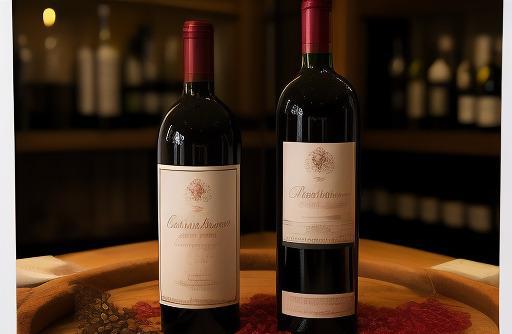- You are here:
- Home »
- Food Substitutes
- » Best Substitutes For Wine
Best Substitutes For Wine

Wine is a versatile and popular alcoholic beverage that is widely used in cooking, baking, and as a standalone drink. However, there may be times when you need to find a substitute for wine. Whether it’s because you prefer not to consume alcohol, have run out of wine, or have guests who don’t drink, there are various alternatives that can mimic the flavor and characteristics of wine. In this article, we will explore the best substitutes for wine that you can use for both cooking and drinking purposes.
Key Takeaways
- Wine can be substituted with non-alcoholic alternatives, such as grape juice, apple cider, or vegetable broth.
- For cooking purposes, vinegar or lemon juice can provide acidity and flavor similar to wine.
- Red wine substitutes include grape juice, pomegranate juice, and cranberry juice, while white wine substitutes include apple juice, white grape juice, and lemon juice.
- Non-alcoholic alternatives can be used as direct replacements in recipes, but may affect the overall flavor profile slightly.
Why You Need A Substitute For Wine
There are several reasons why you may need a substitute for wine. Some common situations where a wine substitute may come in handy include:
- Non-Alcoholic Preferences: If you or someone you’re cooking for prefers not to consume alcohol, using a non-alcoholic substitute ensures that everyone can enjoy the flavors of a dish without the presence of wine.
- Running Out of Wine: It can be frustrating to start a recipe only to find that you’re out of wine. Having a substitute on hand allows you to continue cooking without having to make a trip to the store.
- Unexpected Guests: If you’re entertaining guests who don’t drink alcohol, having a non-alcoholic substitute ensures that everyone can partake in the culinary experience.
- Alcohol Restrictions: Some cultures or religions may restrict the use of alcohol in cooking or prohibit its consumption altogether. In such cases, using a substitute allows you to adhere to these restrictions while still achieving depth of flavor in your dishes.
Types Of Substitutes For Wine

When it comes to substituting wine, there are several categories of alternatives to consider. These include:
- Non-Alcoholic Options: These are beverages that mimic the flavors and characteristics of wine but do not contain alcohol. Grape juice, apple cider, and vegetable broth are commonly used non-alcoholic substitutes.
- Acidity Replacements: Wine often provides acidity to a dish, so when substitution is required, it’s important to find alternatives that can replicate this sourness. Vinegar and lemon juice are commonly used to provide acidity in recipes.
- Flavor Replicators: Wine adds unique flavors to dishes, and replicating these flavors can be a crucial aspect of finding a suitable substitute. Pomegranate juice, cranberry juice, apple juice, and white grape juice can mimic the flavors of different types of wines.
- Color Enhancers: Wine can add color to certain dishes. When substituting for color, consider using substitutes like grape juice, pomegranate juice, or beet juice, which can provide similar deep red or purple hues.
Best Substitutes For Wine

Now that we understand the various categories of wine substitutes, let’s explore some of the best options available.
Non-Alcoholic Substitutes
- Grape Juice: Grape juice is an excellent non-alcoholic substitute for red wine. It provides a similar sweet and fruity flavor that can enhance the taste of sauces, stews, and marinades.
- Apple Cider: Apple cider is another excellent non-alcoholic substitute for wine, particularly red wine. Its tangy and slightly sweet flavor can complement a variety of dishes, including roasts and glazes.
- Vegetable Broth: Vegetable broth is a versatile substitute for white wine in recipes. It adds depth of flavor and moisture to dishes like risotto, soups, and sauces without the use of alcohol.
Acidity Replacements
- Vinegar: Vinegar is a go-to substitute for wine when acidity is needed in a recipe. White wine vinegar can be used as a replacement for white wine, while red wine vinegar can substitute for red wine. Use them in the same amount as the recipe calls for wine to maintain the desired acidity level.
- Lemon Juice: Lemon juice is another readily available substitute for wine. It provides a bright and tangy flavor that closely mimics the acidity of wine. To replace wine with lemon juice, use the same amount as called for in the recipe.
Flavor Replicators
- Grape Juice: As mentioned earlier, grape juice can be used as a substitute for both red and white wine. For red wine, choose a dark grape juice, while for white wine, opt for a lighter grape juice variety.
- Pomegranate Juice: Pomegranate juice works well as a substitute for red wine in certain dishes. It adds a slightly tart and fruity flavor to marinades and sauces.
- Cranberry Juice: Cranberry juice can be used as a substitute for red wine in recipes that call for a fruity and slightly tart flavor. It pairs well with meat dishes and adds a unique twist to glazes and sauces.
- Apple Juice: Apple juice is an excellent substitute for white wine. It provides a delicate sweetness and can enhance the flavors of dishes like soups, sauces, and braises.
- White Grape Juice: White grape juice is another suitable substitute for white wine. It offers a light and fruity flavor that can complement a range of recipes.
Color Enhancers
- Grape Juice: Grape juice, especially dark varieties, can provide a rich red or purple color to dishes that call for red wine.
- Pomegranate Juice: Pomegranate juice is known for its vibrant red color, making it an ideal substitute for red wine when adding color to dishes like stews, sauces, or desserts.
- Beet Juice: Beet juice is a natural dye that can add a deep red hue to dishes. It works best as a color enhancer for red wine substitutes.
Choosing The Right Substitute For Wine

When choosing a substitute for wine, it’s important to consider the flavors and characteristics that the original wine brings to the dish. Ask yourself the following questions to help guide your decision:
- What type of wine is being substituted? Red wine and white wine have distinct flavors, with red being more robust and white being lighter and more delicate.
- Is the recipe calling for acidity? If so, choose a substitute that can provide the necessary level of acidity, such as vinegar or lemon juice.
- Does the dish require color enhancement? Certain recipes may rely on wine for its deep red or purple color. In such cases, consider using grape juice, pomegranate juice, or beet juice as a replacement.
Experimenting with different substitutes can also help you discover new and exciting flavor combinations. Remember to taste test as you cook to ensure that the flavor profiles of the substitutes align with your desired outcome.
Pro Tip: When substituting wine with non-alcoholic alternatives, it’s important to adjust the recipe accordingly. Non-alcoholic substitutes may have a slightly different flavor profile, so it’s best to start with less and gradually add more until the desired taste is achieved.
Cooking With Substitutes For Wine

When cooking with substitutes for wine, there are a few tips to keep in mind:
- Start with Less: Since substitutes may have different flavors or strengths, it’s best to start with a smaller amount and gradually add more if needed. This allows you to maintain control over the taste of the dish.
- Adjust the Texture: Wine can add moisture to a dish, so when substituting, you may need to adjust the liquid content of the recipe. If using a non-alcoholic substitute like grape juice or vegetable broth, you may not need to make any adjustments. However, if using vinegar or lemon juice, you may need to add a small amount of water or another liquid to compensate for the reduced volume.
- Consider the Sweetness: Some substitutes, like grape juice or apple cider, have a natural sweetness. Be mindful of this when cooking, as it may affect the overall flavor profile of the dish. You may need to balance the sweetness with other ingredients like vinegar or spices.
- Taste Test: Throughout the cooking process, taste the dish and adjust the seasoning as necessary. This will ensure that the flavors are well balanced and that the substitute is working effectively.
Recipes Using Substitutes For Wine

Here are a few recipes that can be made using substitutes for wine:
-
Red Wine Marinade Substitute:
- Ingredients:
- 1 cup grape juice
- 2 tablespoons vinegar (red wine or white wine vinegar)
- 1 tablespoon soy sauce
- 1 teaspoon Worcestershire sauce
- 1 teaspoon honey
- Instructions: Mix all the ingredients together and use it as a marinade for meat or vegetables. Let it sit for at least 30 minutes or overnight before cooking.
- Ingredients:
-
White Wine Substitute for Risotto:
- Ingredients:
- 1 cup vegetable broth
- 1 tablespoon lemon juice
- Instructions: In a saucepan, heat the vegetable broth over medium heat. Once warm, add the lemon juice and stir well. Use this mixture as a substitute for white wine in your favorite risotto recipe.
- Ingredients:
-
Beef Stew with Grape Juice:
- Ingredients:
- 2 pounds beef stew meat
- 1 onion, diced
- 2 cloves garlic, minced
- 2 cups beef broth
- 1 cup grape juice
- 2 carrots, peeled and sliced
- 2 potatoes, peeled and diced
- 1 tablespoon tomato paste
- 2 bay leaves
- Salt and pepper to taste
- Instructions: In a large pot, brown the stew meat over medium heat. Add the onion and garlic, and sauté until fragrant. Pour in the beef broth, grape juice, and tomato paste. Stir well to combine. Add the carrots, potatoes, bay leaves, salt, and pepper. Cover the pot and let the stew simmer for 1.5 to 2 hours, or until the meat is tender.
- Ingredients:
These recipes demonstrate how wine substitutes can be used to create flavorful dishes without compromising on taste.
Storage And Shelf Life Of Substitutes
The storage and shelf life of each substitute for wine may vary. Here are some general guidelines to keep in mind:
- Non-alcoholic substitutes like grape juice, apple cider, and vegetable broth can typically be stored in the refrigerator for up to a week. Check the label for specific storage instructions.
- Vinegar and lemon juice can be stored at room temperature in a cool, dark place for a long time. However, they may lose some of their flavor and acidity after a year or two.
- Make sure to check the expiry dates on store-bought alternatives like cranberry juice, pomegranate juice, and grape juice. Once opened, they should be refrigerated and consumed within a week.
It’s best to follow the storage instructions provided by the manufacturer or consult the specific substitute’s packaging for accurate information.
Conclusion
Finding the right substitute for wine can be a game-changer in your culinary endeavors. Whether you prefer non-alcoholic alternatives or need to replace the acidity, flavor, or color that wine brings to a dish, there are numerous options available. Experiment with different substitutes, adjust the recipe accordingly, and enjoy the flavors without compromise. Remember to have fun and let your taste buds guide you as you explore the world of wine substitutes. Cheers!
FAQS
What Are Some Popular Non-alcoholic Substitutes For Wine?
Some popular non-alcoholic substitutes for wine are grape juice, cranberry juice, pomegranate juice, and sparkling water with fruit flavors. These drinks offer a similar taste to wine but without the alcohol content.
Are There Any Sparkling Wine Substitutes That Don’t Contain Alcohol?
Yes, there are sparkling non-alcoholic drinks available on the market that mimic the flavor of sparkling wine. For example, there are sparkling grape juices, sparkling teas, and sparkling water with fruit flavors that can offer a similar taste experience to sparkling wine.
Can I Use Vinegar As A Substitute For Wine In Cooking?
Yes, you can use vinegar as a substitute for wine in cooking but keep in mind that it might alter the flavor slightly. You should choose a vinegar that will complement the dish you are making, such as apple cider vinegar for a pork dish or red wine vinegar for a tomato-based sauce.
What Are Some Non-alcoholic Red Wine Substitutes?
Red grape juice is an excellent non-alcoholic substitute for red wine in cooking and can offer a similar depth of flavor to dishes like beef stews or sauces. You could also use a mixture of red grape juice and red wine vinegar to create a more complex flavor.
What Are Some Good Substitutes For White Wine In Cooking?
White grape juice is a great non-alcoholic substitute for white wine in cooking. You could also use chicken or vegetable stock for a milder flavor, or lemon juice for a tangy and bright taste. In some recipes, you could also substitute dry vermouth for white wine in equal amounts.
Sources
About the Author Jenny
I'm Jenny, a housewife with an unwavering passion for food. My culinary journey began with my grandmother's kitchen, and it's now a full-fledged food blog. I've turned my love for cooking into a creative outlet, sharing recipes and stories with a global community of fellow food enthusiasts. It's proof that being a housewife can also mean pursuing your passions and savoring life's delectable moments.
